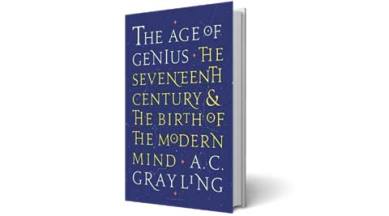📣 For more lifestyle news, click here to join our WhatsApp Channel and also follow us on Instagram
Waiting for Enlightenment
AC Grayling argues that the Enlightenment began in the 16th century, but it is a premise marred by a lack of accuracy and detail

Book: The Age of Genius: The Seventeenth Century and the Birth of the Modern Mind
Author: AC Grayling
Publisher: Bloomsbury
Pages: 368
Price: Rs 499
A belief that Christopher Hill held strong was that the English Revolution of the 17th century, whatever else it might have otherwise achieved, had cleared the decks for capitalism. Scholarly cavils about minor oddities and anomalies left the historian annoyed with those who studied the past to forget the present and deny historical motion in any direction. “Tortoise watching” was the term of disdain he used for such histories.
monthly limit of free stories.
with an Express account.
AC Grayling, philosopher, historian, literary writer and critic, is no tortoise-watcher. His recent book argues that the 17th century changed the human mind irreversibly, and the Enlightenment started early in that century rather than anticipate the phenomenon that Kant would welcome in his 1784 essay ‘What is Enlightenment?’ Grayling’s premise is that the Enlightenment is a historical fact, and not wisdom after the event. Even if the fetish of parceling out epochs in tidy multiples of hundred strikes one as odd, the reader is not any less dismayed by Grayling’s refusal to engage with major critics of the idea of the Enlightenment such as Nietzsche and Adorno. The tough task of refuting the latter is left to authors such as Anthony Pagden (The Enlightenment and Why It Still Matters, 2013), usually named in the endnotes.
It cannot be anybody’s case that the 17th century was not an important historical epoch in the sciences and the arts. The century gave us Shakespeare, Donne, Milton, Bacon, Cervantes, Descartes, Galileo, Kepler, Newton, Locke, Leibniz, Spinoza, Poussin, Rembrandt, Monteverdi and Purcell. But Grayling’s progressivist narrative has room neither for contemporary contestants such as Boehme, Margaret Cavendish, Herder, the neo-Stoic Lipsius, or the Cambridge Platonist Henry More, nor the critics such as Vico and Hamann who came soon after.
Instead of getting stuck in the “enemies of the Enlightenment” as Darrin McMahon called them, Grayling reaches for low-hanging fruit such as recapitulating the tumultuous events, especially wars, that spanned the age. Engagingly narrated, the import is sought to be disentangled from the facts that crowd the page. However, the questions that the author had proposed — were the great intellectual feats of the time the results of major upheavals such as the Thirty Years’ War or the English Revolution, or were they evidence of the randomness of intellectual progress, that happen despite the sordidness of political and social life —remain unanswered. The problem lies in the depth-model silently assumed: events in the background outlined in the first half of the book, and achievements in the foreground, inadequately accounted for by stray comments which recall quasi-positivist assumptions of human progress.
The sacrifice Grayling is prepared to make for turning his eyes away from the crawling tortoise of time is bewildering. There is scant attention paid to accuracy and detail. To take just an instance from literature, much is made of the contemporary audience’s abhorrence of regicide in Macbeth, premiered at court in 1606. None would guess from Grayling’s confident assertions that the extant text of Macbeth is post-1613, that tyrannicide, if not regicide, was a staple theme in the playhouse and in 16th-century Huguenot literature such as the Vindiciae contra tyrannos, and that the first secular tragedy in Europe was the 14th-century Latin play Ecerenis by Albertino Mussato of Padua. His naïve assumptions about playgoers in Shakespeare’s time fail to account for the cuts to the play William Davenant made for a Royalist audience after the theatres were reopened in England in 1660. Contrary to his belief, to cite another howler, many humanists and scholars in the Renaissance were explicitly aware that they were living through a time of renewal of European culture, as was demonstrated long back by Erwin Panofsky.
The book’s strength lies in the stories of individuals who acted as conduits of information and learning — “internet servers” Grayling calls them. Among them were the mathematician Marin Mersenne, the Tassi family which ran a courier service in Europe, the education reformer Samuel Hartlib to whom Milton dedicated On Education in 1644. An exclusive attention to their role in the years leading up to the Enlightenment would have made for a more coherent book.
Even then, the book would have been compromised by the author’s Eurocentric view of human thought. The 17th century was also the time of the great Indian Nyaya philosopher Gadadhar Bhattacharya, of the poet and scientist Baha al-Din Muhammad ibn Husayn al-Amili of Iran who propagated a heliocentric theory, of the Arab scholar Mulla Sadra who anticipated an existentialist interpretation of Islam, and the Chinese naturalist and political philosopher Huang Zongxi. Grayling laments that the world of Islam is so shrouded by Christian hegemony that the light of the 17th century is unable to shine through. Whose century? One would love to know what he would have to say about colonialism, the two world wars, and militant Zionism. To return to questions similar to the ones the author had proposed but was hesitant to answer: were these the products of the Enlightenment, or aberrations that occurred despite what the Enlightenment had reputedly brought to the continent and the benighted colonies?
📣 For more lifestyle news, click here to join our WhatsApp Channel and also follow us on Instagram